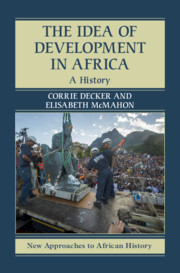Book contents
- The Idea of Development in Africa
- New Approaches to African History
- The Idea of Development in Africa
- Copyright page
- Contents
- Figures
- Tables
- Maps
- Boxes
- Acknowledgments
- Maps
- Introduction
- Part I Origins of the Development Episteme
- Chapter 1 From Progress to Development
- Chapter 2 Knowledge and the Development Episteme
- Chapter 3 Eugenics and Racism in the Development Episteme
- Chapter 4 Decolonizing the Idea of Development
- Part II Implementation of the Development Episteme
- Part III “Problems” in the Development Episteme
- Epilogue
- Bibliography
- Index
- References
Chapter 3 - Eugenics and Racism in the Development Episteme
from Part I - Origins of the Development Episteme
Published online by Cambridge University Press: 16 October 2020
- The Idea of Development in Africa
- New Approaches to African History
- The Idea of Development in Africa
- Copyright page
- Contents
- Figures
- Tables
- Maps
- Boxes
- Acknowledgments
- Maps
- Introduction
- Part I Origins of the Development Episteme
- Chapter 1 From Progress to Development
- Chapter 2 Knowledge and the Development Episteme
- Chapter 3 Eugenics and Racism in the Development Episteme
- Chapter 4 Decolonizing the Idea of Development
- Part II Implementation of the Development Episteme
- Part III “Problems” in the Development Episteme
- Epilogue
- Bibliography
- Index
- References
Summary
Chapter 3 investigates the fundamental role that ideas about racial and cultural difference play in the development episteme. The emerging discipline of physical anthropology in the nineteenth century challenged the notion in Darwin’s evolutionary theory that all human beings are part of the same species. Combined with social Darwinist ideas of the time, this set the stage for racialist discourses that linger in the development discourse. Social Darwinism also fed into the eugenics movements of the early twentieth century, creating new theories of race that pathologized blackness. This racialist thinking viewed Africans and people of African descent as biologically different from whites and in need of evolutionary intervention. Positive eugenicists advocated social welfare to “improve” Africans because they believed environmental factors affected their ability to “evolve” – or in twentieth-first-century terms, “modernize.” Evolutionary humanist theories based in ideas of cultural inequality emerged in the post–World War II era, but these also drew on social Darwinist ideas of race that viewed people of European descent as the evolutionary standard to which all races should strive. This eugenic history of early development policies has largely been forgotten but the rhetoric on racial difference, now masked as “culture,” has stubbornly endured.
Keywords
- Type
- Chapter
- Information
- The Idea of Development in AfricaA History, pp. 58 - 78Publisher: Cambridge University PressPrint publication year: 2020



